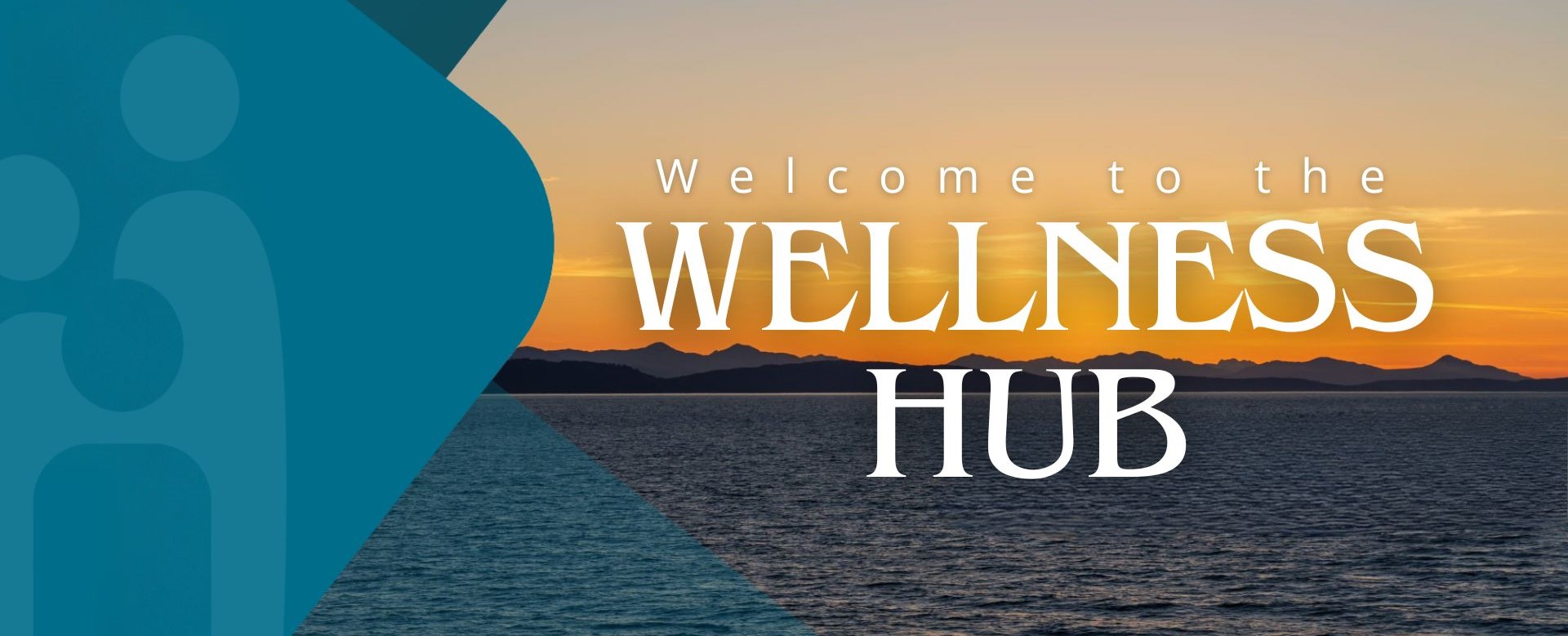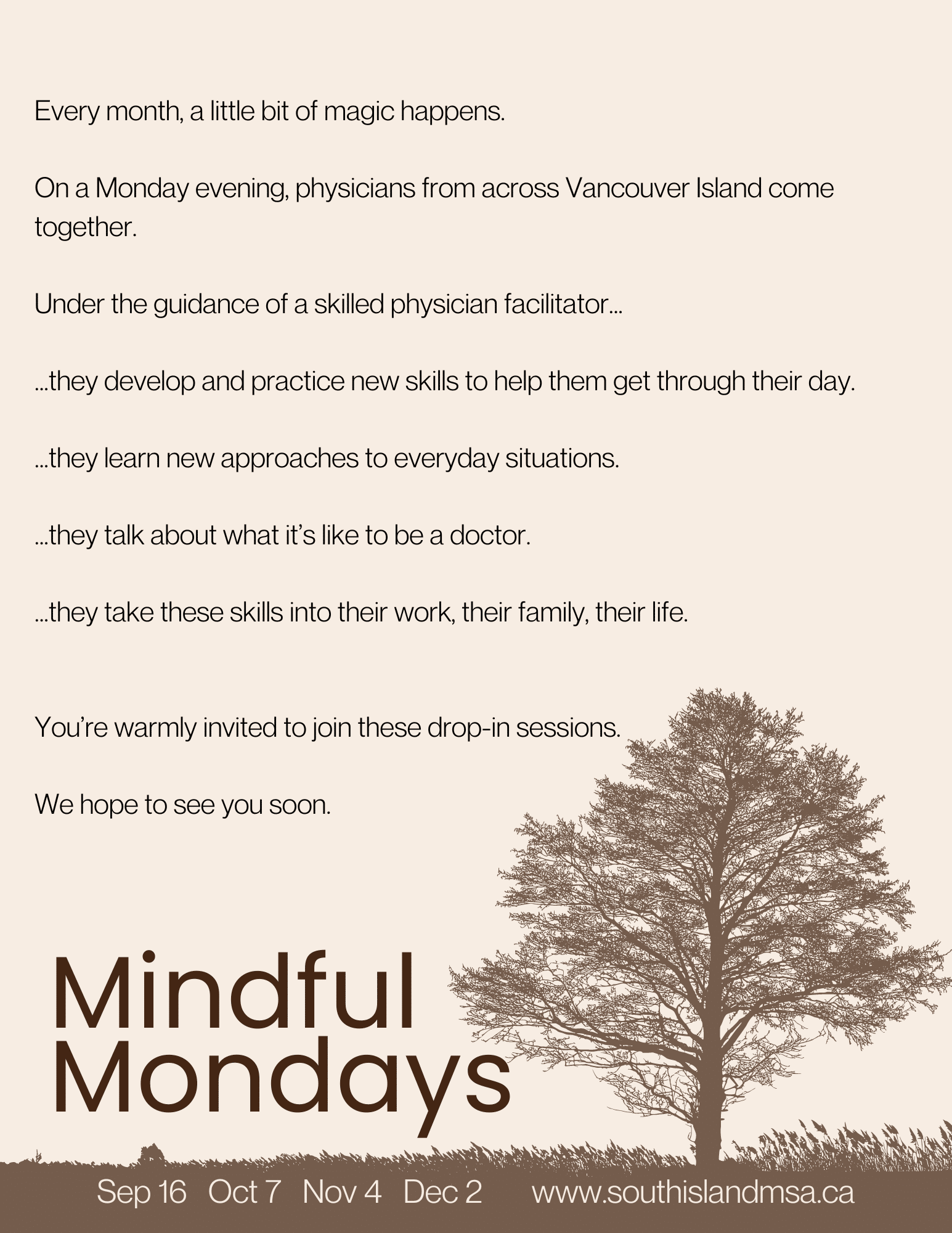
The South Island and Victoria Divisions of Family Practice have partnered to form a Joint Wellness Committee dedicated to enhancing the health and wellness of our physician members. We recognize the significant demands placed on physicians, both professionally and personally, and are committed to providing a range of resources tailored to support your well-being and promote a balanced, healthy lifestyle.
The Well-Being Index – Now Live!
The South Island and Victoria Divisions of Family Practice are excited to invite you to the Well-Being Index – a validated, anonymous, easy-to-use tool to help you gain perspective on your well-being, identify where you might need support, and access tailored resources.
Sign up options:
- Download the Well-Being Index app from the App Store or Google Play and use the invitation code: DIVISIONSWBI
- Access via web browser, click the Register Here link at the very bottom, and use the invitation code: DIVISIONSWBI
- Scan the QR code and use the invitation code: DIVISIONSWBI
What is the Well-Being Index?
The Well-Being Index is a validated, anonymous, self-assessment tool designed to measure and track your overall well-being. It provides personalized insights, comparisons with peers, and resources to support your health and wellness.
What do I do if I already have a WBI account?
If you already have a Physician Well-Being Index account through another organization (e.g., CMPA), you can still access the Divisions tool. When you login, simply enter the same email address you used to create your first institutional account, and both accounts will automatically be linked.
How is the Divisions version of the WBI tool different than the account I already have?
The Divisions version of the WBI tool includes some additional questions (added to the standard validated questions) to help you and the Division better assess your well-being. Other versions of the tool may have slightly different registration questions, so when you add a new organization to your account, you will be asked to respond to these. You only need to respond to these questions once.
If my accounts are linked, can the Divisions see my data?
Your account is private and confidential. The Divisions only receive completely anonymous aggregate data. If you choose to link your accounts, each organization will receive an aggregate of the Index as well as the registration and feedback questions they programmed. Neither organization will be able to identify individuals, view personal data, or access individual accounts.
How does it benefit me as a physician?
The app helps you to better understand your own well-being, identify areas where you might need support, and access resources tailored to your needs. By establishing a baseline and tracking your progress, you can prioritize self-care and maintain long-term resilience in your professional and personal life.
The app also gives you the unique opportunity to see how you’re doing compared to other physicians. This can help you:
- Gain perspective and validate your experience: Seeing your results in the context of your profession can be a reminder that you are not alone with experiences such as burnout or stress, and that these experiences are not personal failures.
- Identify strengths and opportunities: Seeing your results in the context of others can help you interpret your data. Understanding how others are doing highlights where you are resilient and thriving and where you may need to take steps to prioritize your well-being.
- Confirming when you need more help: If your scores differ significantly from the average, it could signal the need to explore additional resources or strategies tailored to your unique circumstances.
Is my data confidential?
Yes. All data entered into the Well-Being Index is secure and confidential. Individual responses are de-identifiable, and no personal or identifiable information is shared without your consent. Your individual results remain private and are not accessible to anyone but you.
How will the data be used?
Your data will be aggregated and analyzed to provide group-level insights for the South Island and Victoria Divisions in order for us to better understand our members’ needs and ensure our wellness initiatives are tailored to those needs. The initial campaign will allow the Divisions to gather baseline information that cna serve as a benchmark for measuring future improvements.
What features does the Well-Being Index offer?
- A quick, anonymous self-assessment
- Trends to track your well-being over time
- Access to local and national wellness resources tailored to your needs
- Benchmarking compared to a large, anonymized physician sample
How does the app measure well-being?
The Well-Being index uses a short, validated questionnaire that evaluates factors such as distress, fatigue, and quality of life.
Can I track my progress over time?
Yes. The app allows you to review your past assessments and monitor your well-being trends over time.
Is it free to use?
Yes, the app is free for participating physicians. Please ensure you use the invitation code: DIVISIONSWBI upon registering.
Is it mobile-friendly?
Yes, the app it optimized for both mobile and website use.
How do I link my account if I already use the Index?
If you have an existing WBI account, please enter the same email address as your current account. The WBI will recognize your email and ask if you’d like to associate with the South Island and Victoria DoFP account.
How much time will it take to complete?
The assessment takes less than 3 minutes to complete.
How often will I be expected to complete it?
You can answer the questions as often as you like for your own self-reflection. Regular participation (e.g., monthly) is recommended for meaningful tracking.
How will my input contribute to future wellness programs?
Aggregated data from the Index will help identify trends and guide the development of programs and initiatives that address the specific needs of physicians. Your input will help us understand what our community needs the most.
Who do I contact if I have technical issues?
Please contact the Divisions Well-Being Index Administrators at well@sidfp.com.
Can I provide feedback on my experience?
Yes! We want to hear from you. There are optional feedback questions that will pop up after you complete the Index, which you can answer through the app. Or, you can email us at well@sidfp.com anytime.
Dips for Docs
Be brr-ave and take the plunge!
Join your colleagues for a refreshing cold water dip at our monthly meet-ups. First-timers will receive a complimentary t-shirt or toque.
Check out our Events calendar for upcoming dates.

Mindful Mondays are Back!
We’re thrilled to offer our Virtual Mindful Mondays! Physicians from up and down Vancouver Island are welcome to join.
This is a physicians-only place to gather, chat, and connect. Each session will be facilitated by one of our wonderful Mindful Monday physician leaders.
There’s no need to RSVP, just drop in whenever you can, as you are.
To join our reminder list, please email info@southislandmsa.ca – links will be sent out the Friday before the monthly meetup.
Check out our Events calendar for upcoming dates.

Greater Victoria Peer Support Program
The Greater Victoria Peer Support Program offers short-term, one-to-one peer support to physicians across our region. Our local peer supporters are trained and available to listen to their colleagues and help guide through next steps.
To request to be connected to a peer supporter, please complete the confidential request form.
If you are in crisis, the Physician Health Program is available 24/7 at 1-800-663-6729.
What is Peer Support?
Peer support encourages an authentic human connection with another person who shares similar life experiences – in this case, the unique stressors and challenges faced by family physicians. Peers offer confidential, non-judgemental listening and non-clinical support with life, work, and other issues.
Peer support is distinct from:
- Therapy
- Mentorship where an experienced peer is providing clinical or career advice
- Direct clinical care
While peer supporters are here to listen, issues such as suicidality, substance use, mental health concerns, and personal medical advice are out of scope. However, they can connect you with the appropriate services.
When might someone benefit from peer support?
Peer support might be helpful for physicians who experience work or life stressors and require emotional, non-judgemental support. Examples of these scenarios might be:
- Adverse clinical event (including but not limited to an adverse patient outcome)
- Patient or colleague complaint
- Interpersonal/relational conflict with a patient or colleague
- Acute life stressors which impacts your career (e.g., birth of a new child or bereavement)
- Struggles with burnout/moral injury
- A change that has happened at work that impacts you emotionally
What are the goals of peer support?
- Create a safe space for peers to share experiences and seek emotional support
- Listen non-judgementally, validate, and empathize with the experience of peers
- Empower peers to recognize existing strengths and resources, and build on coping strategies that work for them
- Connect peers with community resources if they need support beyond the scope of peer support
- Promote a broader sense of community and a positive, supportive workplace culture
How confidential is peer support?
Confidentiality is integral to the success of a peer support interaction. Peer supporters sign a confidentiality agreement following their training. These conversations are discoverable from a legal perspective, so peer supporters do not take written notes during interactions and do not focus on the details of the situation. Rather, they focus on the emotional impact of the situation and coping strategies. You connecting with a peer supporter is a private decision. Your request for support will not be reported to the College, Island Health, or your colleagues. There are rare cases where confidentiality must be broken, such as when a physician is at risk of harming themselves or others, or if a peer supporter has a direct reason to believe that someone is at risk for unsafe behaviour. These are the same reasons a peer supporter may have to break confidentiality in their everyday clinical practice as a physician.
